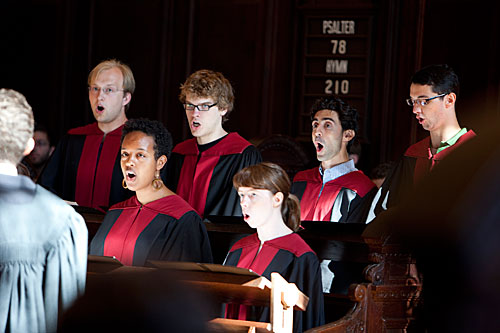
Harvard University President Drew Faust delivered the Morning Prayers in Appleton Chapel. Faust said Harvard’s history calls to mind the great responsibility that comes with a great education, “the privilege to contribute to purposes larger than ourselves.”
Photos by Rose Lincoln/Harvard Staff Photographer
It’s morning in a new year
At opening prayer service, Faust explores Harvard’s future, with an eye to the past
Harvard President Drew Faust opened the academic year on Wednesday during the time-honored tradition of Morning Prayers in Appleton Chapel, explaining the importance of Harvard’s 375 years of history through the words of one of America’s most beloved everyman philosophers: catcher Yogi Berra.
“The future, Yogi Berra is said to have observed, isn’t what it used to be,” said Faust, a longtime baseball fan. “That is because we are living in a future our predecessors in this remarkable institution worked to create for us.”
As Harvard prepares to mark its 375th anniversary with a yearlong celebration highlighting its rich history and its dedication to teaching, learning, innovation, and research, Faust encouraged listeners to call to mind the University’s distinguished past as a way to envision its bright future.
Faust said history is a great teacher that imparts vital lessons about change and continuity, perspective and opportunity, and “offers us the foundation for imagining a different world and understanding what it takes to build it.”
The daily ritual of Morning Prayers dates back to Harvard’s founding in 1636. During the academic year, members of the Harvard and Cambridge communities gather daily for a brief service of reflection and song in the serenity of the chapel in Memorial Church. As is customary, the Choral Fellows of the Harvard University Choir performed, led by Edward Elwyn Jones, the Gund University Organist and Choirmaster.

Faust said Harvard’s history calls to mind the great responsibility that comes with a great education, “the privilege to contribute to purposes larger than ourselves.”
Citing such noted Harvard alumni as John Adams, John F. Kennedy, Henry David Thoreau, Margaret Atwood, Adrienne Rich, Charles Sumner, W.E.B. Du Bois, and Helen Keller, Faust reminded listeners of their predecessors and their important contributions to the arts and to creativity, equality, human rights, public service, and intellectual discovery. She also mentioned those whose names are listed on the walls of the Memorial Church and Memorial Hall, who gave their lives in wartime service to the nation.
She urged the audience to consider the art of the possible by remembering the dedication of those past and present.
“To have a history,” Faust said, “is to have a context — for both insight and action. It is to know that we, and those who have preceded us, have been dedicated to using knowledge to invent a future.”
“History,” said Faust, “is where the future begins.”
To read the full text of President Drew Faust’s Morning Prayers.




